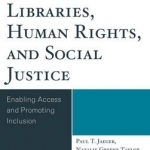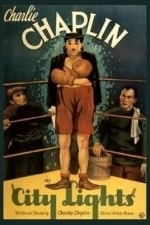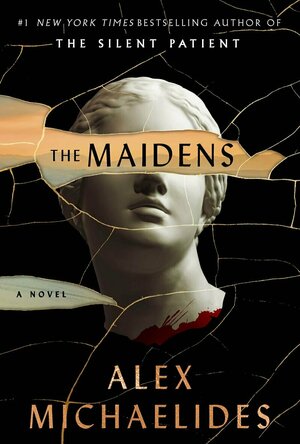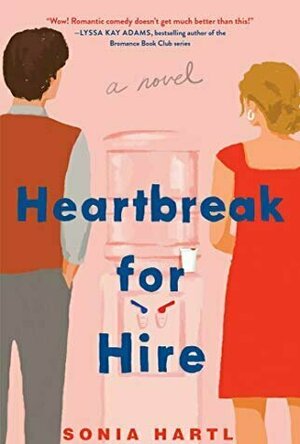
The Fractional Trigonometry: With Applications to Fractional Differential Equations and Science
Tom T. Hartley and Carl F. Lorenzo
Book
Addresses the rapidly growing -field of fractional calculus and provides simpli-fied solutions for...

Libraries, Human Rights, and Social Justice: Enabling Access and Promoting Inclusion
Paul T. Jaeger, Natalie Greene Taylor and Ursula Gorham
Book
Libraries, Human Rights, and Social Justice: Enabling Access and Promoting Inclusion examines the...

The Better Angels of Our Nature: A History of Violence and Humanity
Book
-Shortlisted for the Samuel Johnson Prize 2012 This acclaimed book by Steven Pinker, author of The...
Anil Kapoor recommended City Lights (1931) in Movies (curated)
Kristy H (1252 KP) rated The Maidens in Books
Jun 24, 2021
"Death was no stranger to Mariana; it had been her traveling companion since she was a child--keeping close behind her, hovering just over her shoulder. She sometimes felt she had been cursed, as if by some malevolent goddess in a Greek myth, to lose everyone she ever loved."
Unpopular opinion time... this book did not work for me. I did not find it engaging nor interesting. I had to force myself to keep reading, as I did not care for any of the characters, including Mariana and Zoe. Mariana is fixated on Edward Fosca from the beginning and seems convinced she should insert herself in a rather serious murder investigation despite not seeming one bit qualified. I'm not sure how her group therapist qualifications lend her any credentials and she lies constantly, much to the annoyance (justified) and detriment of the police. There are basically no sympathetic characters, and there seems to be no reason to care about the murdered women, as we're given no background on them. Some characters (e.g., Julian) seem inserted for no reason whatsoever.
There is a lot of Greek mythology tucked into the story and perhaps I was just over it, as I've read several books revolving around Greek myths lately. It was a lot, though, and sometimes did not seem relevant to our story.
This thriller is certainly atmospheric, with Cambridge playing a strong role in the setting. You definitely feel a part of the academic setting, and I learned a lot about the university while reading. It's dark and somewhat foreboding, but since I was not fully invested in the story, I could only feel so tense. There are some twists, but the big twist came too late and seemed too preposterous to be truly exciting. The author throws in so many red herrings that you find yourself almost rolling your eyes.
Still, this is a very popular thriller for many readers, so chances are it may work for you. For me, it just didn't hold my interest or seem all that, well, thrilling. 2 stars.
Kristy H (1252 KP) rated Heartbreak for Hire in Books
Aug 19, 2021
Heartbreak for Hire, an undercover operation that specializes in a variety of revenge schemes for jilted lovers, annoyed coworkers, and more. She dropped out of grad school in the aftermath of a disastrous relationship--much to the despair of her mother--but the job helps Brinkley save for her dream of opening her own art gallery. However, when her boss Margo announces she's hiring male Heartbreakers for the first time, Brinkley starts questioning her purpose, especially when one of the new hires is a target she was paid to take down. Markus Cavanaugh is an adjunct anthropology professor at University of Chicago. He doesn't seem like the backstabbing academic she was told to go after... and as she gets to know Markus more and continues to question her role as a Heartbreaker, Brinkley realizes a lot of things aren't what they seem.
"I had my career, my cat, control. The Three C's of avoiding that hopeless cycle of loving someone who didn't love me back."
I feel awful, but this book just did not work for me at all. I almost didn't finish it, but I really try to complete all my ARCs. Ironically I hated most of it except the end, which was actually pretty good. But most of this one had me cringing. Brinkley's job is terrible and makes no sense--I couldn't even see how Heartbreakers and the division of "Egos, Players, Cheaters, and Grifters" would even possibly translate to the real world. Her boss is absolutely awful.
"If we trained men to break women's hearts, what did that say about our mission? What did that say about us?"
The book is filled with ridiculous contrived fights and plot-lines, and I didn't buy the relationship between her and Markus at all. They like each other, hate each other, rinse and repeat, with a bunch of silly "twists" thrown in over and over to keep them apart. Do something and stop whining (this applies equally to them both). It was just boring and stupid, and I couldn't handle all the bad decisions. If there's going to be conflict, I want it to be realistic, and if there's going to be romance, I want to buy into the couple and feel a genuine affection toward them. But with everyone being so hateful to each other, an entire profession created toward tearing people down, and a bunch of random contrived obstacles thrown up to keep Markus and Brinkley apart... I just couldn't handle it.
A lot of other people enjoyed this one far more than me, so hopefully you will too.
I received a copy of this book from Gallery Books and Netgalley in return for an unbiased review.
Deborah (162 KP) rated Richard III: The King in the Car Park in Books
Dec 21, 2018
I will admit that with pro-Ricardian sympathies I was probably never going to like this book, but it is a bit of a mess and feels like another case of jumping on the bandwagon. There is no index, no footnotes/endnotes and only a partial list of sources, which is enough to raise questions about academic rigour. If you are going to publish opinions, particular in The Great Debate, these really should be backed up by factual evidence. I think I am most irked by the hypocrisy of Mr Breverton telling us at one point that he is going to take a fresh impartial look at the subject and then immediately showing us exactly which colour he prefers his roses.
His list, near the back of the volume, of all the 'crimes' he thinks Richard III was guilty of really does teeter on the brink of blindness and absurdity. Apparently he is guilty in the case of the Earl of Warwick, son of Richard's older brother, George of Clarence, but whose claim to the throne was barred by his father's attainder (always reversible, but Warwick was then only a child of about 8 years). I'm pretty sure this Warwick was sent to Sheriff Hutton Castle to be brought up with other young persons, as befitted his status by Richard. Of course, as soon as Henry Tudor usurped the throne, this boy was locked up in the Tower only to be executed later on a trumped up charge. I think I know who the guilty party is in that case.
That is my frank opinion on this volume; I will now expect said author to savage me as he has everyone else on Amazon who has pointed out the self-evident shortcomings in this work.

QVprep English Grade 5
Education
App
If you practice hard, you can excel !! QVprep Learn English for grade 5 helps you create a strong...

FreshGrade for Parents
Education and Productivity
App
FreshGrade for Parents gives you a virtual window into the classroom, providing visibility into your...

ESP: English Spelling & Punctuation
Education and Reference
App
English Spelling & Punctuation (ESP) is a new and exciting app that will help you to improve your...



